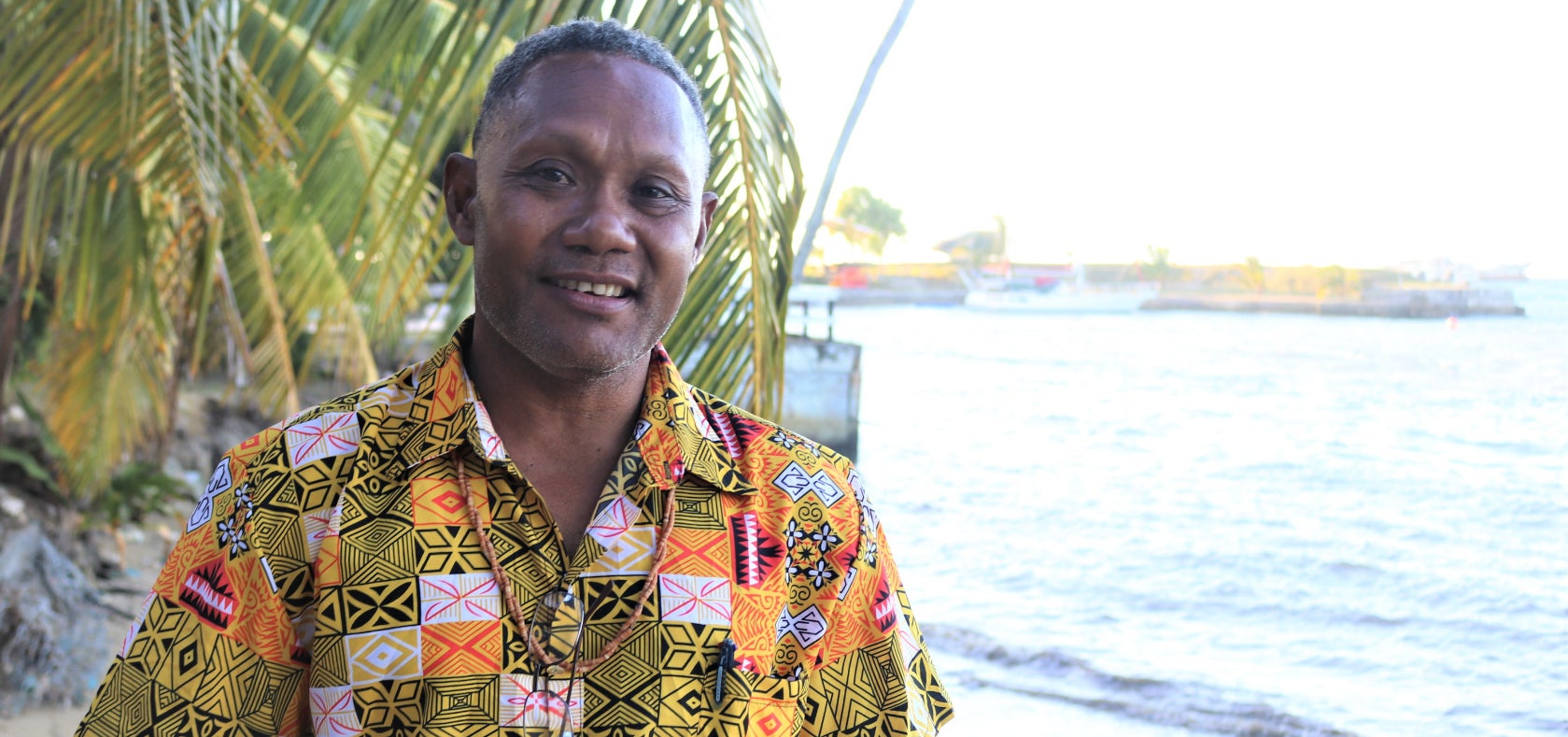In the words of John Mark Hou: “Violence can be prevented if men change their behaviour”
Date:

John Mark Hou, 53, serves as the Chairperson of the Male Advocate Programme at Malaita Christian Care Center (MCCC) in the Malaita Province of the Solomon Islands, working under the guidance of Coordinator, Sister Doreen Awaiasi. Growing up, he was raised with traditional beliefs about men's superiority over women, but this changed when he met the sisters from MCCC and was introduced to male engagement in preventing violence against women and girls through the Warwick Principles: Best Practices for Engaging Men and Boys in Preventing Violence Against Women and Girls in the Pacific, developed by the Regional Pacific Women’s Network Against Violence Against Women and UN Women.
![]()
I was brought up in a remote community in South Malaita. My father was very strict. He would whip me if I went out without his permission. He also taught me that certain jobs were meant for women, while others were meant for men. Living among ten families, I learned how men ‘should treat women’ based on our local beliefs. As a young boy, I followed those norms and accepted the idea of men being superior to women.
During my secondary education at a Christian school, I was exposed to the work the sisters did for the community. Inspired by their mission, I made a vow to support their ministry. I became one of two thousand associates volunteering my time and providing financial support for their work. It was these sisters who encouraged me to improve myself to fulfill Christian duties and ultimately find peace and happiness.
In 2018, I helped the sisters in constructing the Malaita Christian Care Center, the first women’s shelter in Malaita. Then I was invited to attend a conference in Fiji as a male advocate from the Solomon Islands. Through discussions on the Warwick Principles and training on men's role in violence against women, I realized there were gaps in my understanding. Violence can be prevented if men change their behaviour. Men have to be onboard as allies. This inspired me to start our male advocacy programme.
When I returned to Malaita, we called upon men and boys from the community to join us as male advocates. We are volunteers driven by passion and love—for Christ, the community, and the people. Together, we established guidelines. Rule number one: be a role model to other men and boys by demonstrating non-violent behavior. Rule number two: respect your wife and children. Rule number three: stand against all forms of violence. These principles govern male advocates.
So far, we have reached twenty-four communities across Malaita. Our lawyer explains the laws, police officers discuss community policing, and pastors address family and peace. Male advocates, led by a government representative, conduct training for men and boys to shift mindsets and promote peace through positive masculinity. We make plans with men in the community: how to control their anger, manage addictions, communicate with their wives and children, and call out for violence. We set a timeframe—say, in two months—to implement these plans to see if it works. If any community member witness’s violence, they report it directly to us or to the police. That's how we operate, and it's been working very well.
This programme is changing the community, and it has also changed my life. In my work in the medical field, I uphold honesty and transparency— the core principles of a male advocate. Patients feel safe and protected when they come to me, and they recommend my services to others. As a result, I have now more clients seeking my services.
At home, my wife and I communicate [better] with each other, learn from our mistakes, and we manage our family together. Just as I preach as a male advocate, I want my family to be free from violence and feel safe and peace at home. We must have this happiness and live a full life."
UN Women is a longtime partner of the Malaita Christian Care Center (MCCC) through the Pacific Partnership to End Violence Against Women and Girls. This programme is primarily funded by the Government of Australia, the European Union, and is jointly coordinated by UN Women and the Pacific Community (SPC), in strategic partnership with the Pacific Islands Forum (PIF). MCCC is a key member of SAFENET, Solomon Island’s national gender-based violence response service delivery network, led by the Ministry of Women, Youth, Children and Family Affairs with key multisectoral partners. SAFENET is also supported by UN Women through the Pacific Partnership. Phase II (2023-2027) of the Pacific Partnership builds on the achievements of Phase I (2018-2023), advancing strategic regional and national partnership and initiatives to promote gender equality and end violence against women and girls.